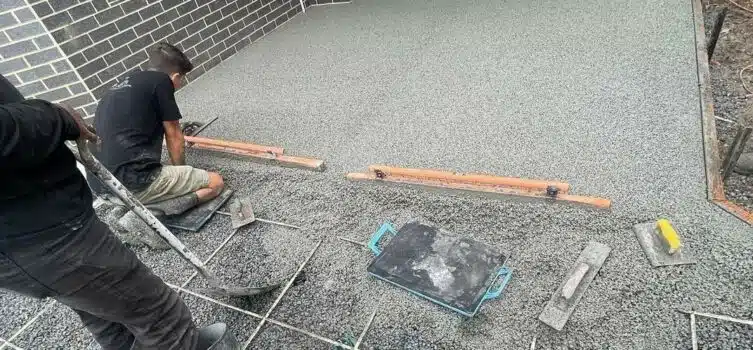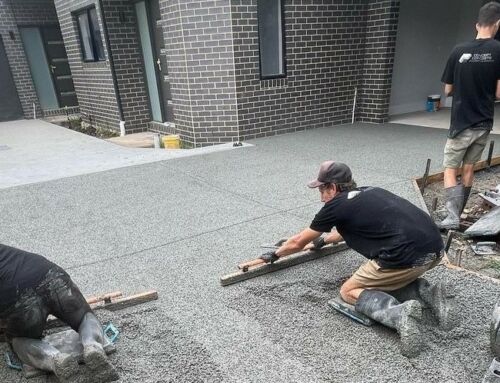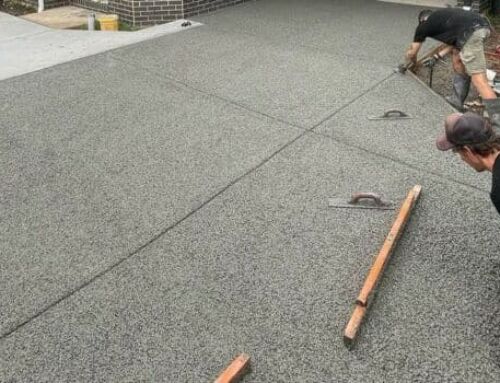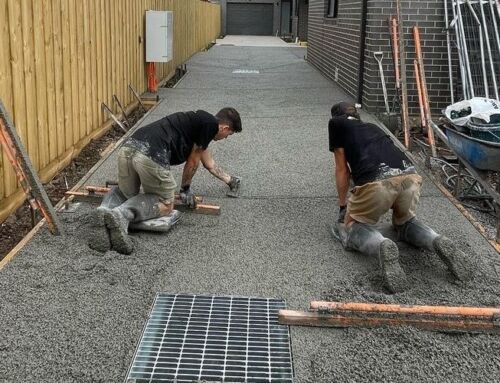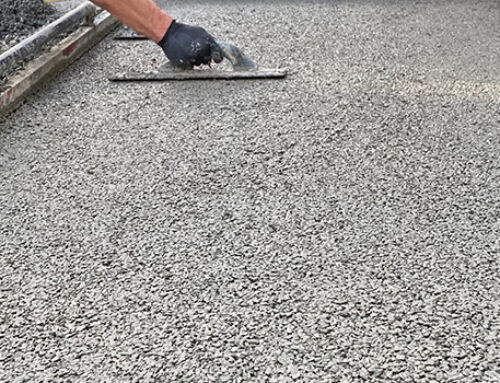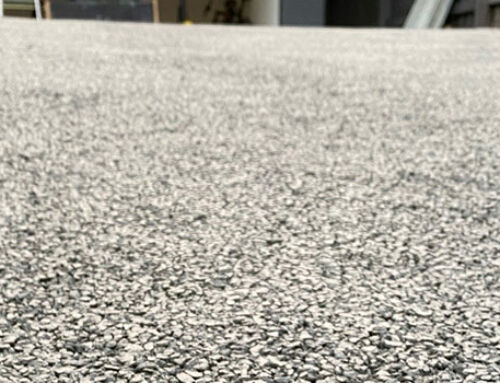More and more Melbourne homeowners are looking for easy and low-maintenance solutions to create additional usable space in their outdoor areas.
One of the top solutions?
Pavers.
The challenge is, that pavers come in a wide variety of sizes, materials, and types.
Some allow water to pass through, known as permeable pavers. Others won’t allow for the movement of water, known as non-permeable pavers.
More than an aesthetic choice, this is a potentially significant difference when you’re dealing with a yard that has poor drainage since it can make or break turning your garden into something resembling a swamp.
When it comes to choosing between permeable pavers vs. non-permeable pavers, there’s more to look for than just whether they let water pass through.
To help you make an informed choice, we’ll cover:
- A brief overview of permeable pavers vs. non-permeable pavers
- Comparisons of each paver type
- Simple tips to match pavers to your property
Whether you’re planning a new driveway, revamping your backyard, or just curious about sustainable urban design, this guide has got you covered.
So, buckle up and get ready to pave the way to a more informed choice!
CONCEPT CONCRETE TIPS:
|
Permeable Pavers vs. Non-Permeable Pavers: Pros and Cons of
Permeable Pavers
Pros:
- Environmental Benefits: They are a champion for the environment. They reduce water runoff, prevent flooding, and recharge groundwater by allowing rainwater to seep through.
- Heat Reduction: These pavers help combat the urban heat island effect. Their ability to absorb and manage water keeps surfaces cooler.
- Reduced Erosion: By allowing water to pass through, they prevent the erosion that often occurs with conventional paving solutions.
Cons:
- Maintenance: They require more regular maintenance. Debris and sediment can clog the gaps, necessitating periodic cleaning to maintain permeability.
- Cost: Generally, they are more expensive to install than their non-permeable counterparts due to the additional layers required for proper drainage.
- Limited Load-Bearing Capacity: While great for pedestrian areas and driveways, they might not be suitable for heavier vehicles or industrial applications.
Learn more: Pros and Cons of Permeable Paving
Non-Permeable Pavers
Pros:
- Durability: These pavers are incredibly durable and can handle high-traffic areas and heavy loads, making them ideal for commercial spaces and busy walkways.
- Low Maintenance: They require less upkeep. They are easier to clean and less prone to damage from roots or settling.
- Variety of Designs: Available in a wide range of colours, textures, and patterns, they offer more flexibility in design.
Cons:
- Water Runoff: The biggest drawback is their contribution to stormwater runoff, leading to potential flooding and pollution in waterways.
- Heat Retention: They can retain heat, contributing to the urban heat island effect, and making surrounding areas hotter.
- Environmental Impact: Their impermeability can negatively impact the natural water cycle and local ecosystems.
How to Balance Efficiency, Cost, and Sustainability
Making the right choice in pavers for your Melbourne property involves a detailed comparison across several key factors. From efficiency to environmental impact, each aspect plays a vital role in determining the best option for your needs.
Efficiency and Installation Ease
- Permeable Pavers: Installation is more complex due to the need for additional layers for drainage. However, their efficiency in managing water runoff and reducing flood risks is unmatched.
- Non-Permeable Pavers: Easier and quicker to install since they don’t require additional drainage layers. They’re efficient in terms of time and initial labour.
Cost Considerations
- Permeable Pavers: Initially more expensive due to the complexity of installation and materials. However, they can lead to long-term savings by mitigating flood damage and reducing the need for separate drainage systems.
- Non-Permeable Pavers: Less expensive upfront, making them a cost-effective option for those on a tighter budget.
Ready to get started? Get our price breakdown: How Much Does Permeable Paving Cost?
Durability and Lifespan
- Permeable Pavers: While highly durable, their lifespan can be affected by clogging if not maintained properly. Regular cleaning is essential to maintain their permeability and longevity.
- Non-Permeable Pavers: Extremely durable and typically have a longer lifespan with minimal maintenance. Ideal for high-traffic areas and heavy load-bearing applications.
Aesthetics and Design Flexibility
- Permeable Pavers: Available in various designs and styles, they offer aesthetic appeal while being environmentally friendly. Their unique look can add character to a property.
- Non-Permeable Pavers: Offer a wider range of colours, textures, and patterns. They’re a go-to for those looking to match specific design aesthetics.
Environmental Impact
- Permeable Pavers: They excel in environmental sustainability. By allowing water to infiltrate, they replenish groundwater and reduce pollution.
- Non-Permeable Pavers: While they lack environmental benefits, innovations in materials and installation techniques are helping to reduce their ecological footprint.
What About Durability and Cost?
Durability
Permeable pavers are noted for their strength and longevity. They are up to four times stronger than concrete and have twice the lifespan of traditional driveways.
Their joint design allows for flexibility and durability as ground conditions change, making them less prone to cracking in events like earthquakes or ground shifts.
Cost and Maintenance:
While permeable pavers may have a higher initial cost, averaging around $180-$190 per m2 including installation, they offer long-term savings in maintenance and potential stormwater management.
Helpfully, their maintenance is simpler and less costly compared to traditional paving options.
Matching Pavers to Your Project
Choosing between permeable pavers vs. non-permeable pavers hinges on the specific needs and characteristics of your installation project.
Here’s how you select the ideal paver type based on various installation scenarios.
Residential Driveways and Walkways
- Permeable Pavers: Ideal for residential areas, especially in regions prone to heavy rain. They manage water runoff efficiently, reducing the risk of flooding and water damage. Their eco-friendly nature and potential for government rebates make them a smart choice for environmentally conscious homeowners.
- Non-Permeable Pavers: Suitable for driveways with heavy vehicle traffic due to their durability. They’re also a practical option for areas where water drainage is less of a concern or where budget constraints are a priority.
Commercial Spaces and High Traffic Areas
- Non-Permeable Pavers: The go-to choice for commercial spaces, parking lots, and other areas with heavy footfall or vehicle traffic. Their strength and low maintenance requirements make them suitable for these demanding environments.
- Permeable Pavers: Can be used in less trafficked areas of commercial properties, such as landscaped areas, to aid in stormwater management and reduce heat island effects.
Garden Paths and Patios
- Permeable Pavers: Excellent for garden paths and patios, as they blend aesthetics with functionality. They allow rainwater to nourish the surrounding soil, benefiting plant life and reducing the need for additional irrigation.
- Non-permeable pavers: Can be used for more formal, structured garden paths and patios where water runoff is controlled through other means, such as drainage systems.
Ecologically Sensitive Areas
- Permeable Pavers: Highly recommended for installations near water bodies or in ecologically sensitive areas. By allowing water to seep into the ground, they help protect these areas from the adverse effects of stormwater runoff.
Sloped Surfaces
- Permeable Pavers: Suitable for gently sloped surfaces, as they can help control erosion and manage water runoff. However, their effectiveness decreases with steeper slopes.
- Non-Permeable Pavers: More appropriate for steeply sloped areas, where permeable options may not provide sufficient stability or erosion control.
The Final Verdict: Choosing the Right Paver
Let’s revisit the key points to aid in your final decision-making process.
When deciding which paver type is right for you, consider the following:
- Project Type: Residential areas and gardens may benefit more from permeable pavers, while commercial spaces or high-traffic areas may find non-permeable pavers more suitable.
- Environmental Impact: If sustainability and eco-friendliness are priorities, permeable paving is the way to go.
- Maintenance and Longevity: Consider the maintenance you’re willing to undertake and the lifespan you expect from your pavers.
- Budget Constraints: Non-permeable pavers are more budget-friendly upfront, but permeable pavers can offer long-term cost benefits.
- Aesthetics: Non-permeable pavers offer more design flexibility, which may be crucial for some projects.
- Local Climate and Topography: In areas with heavy rainfall, permeable pavers can be more beneficial for managing water runoff.
The right choice will depend on a blend of personal preferences, project requirements, and environmental considerations.
If you want to learn more, check out our other resources:
Ready to Pave Your Path? Contact Concept Concrete Today
Whether you’re seeking a solution that aligns with your environmental values, fits within your budget, or meets your design aspirations, expert guidance is key.
Reach out to a member of our experienced team for:
- Personalised Advice: Our team is ready to provide tailored recommendations based on your unique needs and project specifications.
- A Custom Quote: Unsure about costs? Let us provide you with a detailed quote that considers your preferences, the specifics of your installation, and the most suitable paver options for your property.
- Quality Assurance: With our expertise and commitment to quality, you can be confident in making a choice that not only looks great but also stands the test of time.
Whether it’s a new driveway, a charming garden path, or a robust commercial paving project, we’re here to ensure your vision comes to life with the perfect paving solution.

